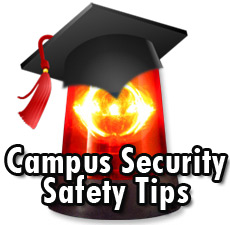Campus Safety Tips
Tips from the UCSD Police Department for keeping yourself safe in various situations.
 General safety tips
General safety tips
- Be especially aware of your surroundings at times when you may be less alert and more vulnerable to an attack (e.g., during periods of stress) when you are upset or sick, or if you have been drinking.
- Use discretion and caution when taking shortcuts through isolated parts of the campus.
- If you must be in an isolated area (e.g., working or studying alone in labs or offices) lock the doors and tell a friend or the Police Department where you are and when you plan to leave.
- Know the location of campus emergency telephones on routes to and from campus destinations.
- Keep personal belongings in view while eating, meeting, or shopping on campus.
- Whenever you are on campus or off, and see or hear someone who might be in trouble, your options include running, yelling, confronting, and calling the Police Department (9-1-1).
- Learn self-defense techniques. Classes are offered at UCSD.
- Use the Community Service Officer (CSO) Escort Program, (Get and keep the number), available daily usually from 5 p.m. to 1 a.m (Varies from campus to campus).
- Use the campus shuttle from 7 a.m. to 12:15 a.m. with stops located throughout campus and outlying parking lots.
Residence halls
- Think of your residence hall as your home. Remember that by taking a
 share of the responsibility to keep your residence safe, you can make a difference. Contact residential life staff regarding your security/ safety concerns.
share of the responsibility to keep your residence safe, you can make a difference. Contact residential life staff regarding your security/ safety concerns. - Keep doors locked — even if you are going to be gone only a few minutes.
- Door-to-door solicitation is prohibited on campus. Please report the presence of solicitors to the Police Department.
- Notify the Police Department or residential life staff of suspicious individuals who appear to be “hanging around.”
- Take security regulations seriously for your own protection.
- If you leave for an extended vacation, take high-value personal property with you.
Apartment or home
- Install and use locks on your doors and windows.
- Keep doors locked day or night whether you are home or not.
- Know who is at the door before opening it. Insist on seeing an ID from anyone you do not know.
- If someone comes to your door and asks to use your telephone to call for help, offer instead to make the call.
- Door-to-door solicitation is prohibited on campus. Please report the presence of solicitors to the Police Department.
- Give your home a “someone is home” look. Put radio and lights on a timer.
- Maintain good lighting around entrances.
- Leave spare keys with a friend, not in accessible places.
- Keep emergency numbers near the telephone.
Driving a car
- Have your keys in your hand as you approach your car.
- Lock your doors when driving and after parking.
- Check the backseat and floor before entering your car.
- Keep your valuables out of sight, under the seat, or in the glove compartment or trunk.
- Park in well-lighted areas.
- If you have car trouble, signal for help by raising the hood or tying a handkerchief to the door handle. Remain in your car with doors locked until identifiable help arrives. Should another motorist offer to help, roll down the window slightly and ask them to call the police or an auto club.
- Keep an emergency kit containing a flashlight, flares, telephone change, distress signs, and other essentials in your car.
- To protect your car, use a lock bar that prohibits the use of the steering wheel.
- Consider also the installation of an alarm system, ignition by-pass, or fuel shut-off switch in your car.
On the telephone
- Be wary of telephone surveys.
- List only your first initial and last name in the telephone directory.
- If you receive a threatening or obscene telephone call, hang up. Contact the Police Department and make a report.
- Answering machines are useful in screening calls. Your outgoing message should not say that you are away from home.
In an elevator
- Check the inside of an elevator before entering. Wait for the next elevator if you are unsure of the people inside.
- When riding an elevator, stand by the control board. If you feel in danger, press all the buttons and get off the elevator as soon as possible.
- Most elevators on the UCSD campus are equipped with emergency telephones.
Self defense
- If someone tries to snatch your purse, let it go. Most injuries from robberies occur when people resist during purse snatches.
- If you are attacked, whether you resist and how you resist will depend on your personal resources and your personal values. Give some thought right now to what you would do in various situations that could arise. The more you have thought ahead, the more likely you will be to act in the way you have planned.
- In considering your reactions to different situations, keep these three basic rules in mind:
- Trust your instincts.
- Don’t be afraid to be impolite or make a scene; this is especially important if someone you know threatens or attacks you.
- Try to remain calm and use your imagination and good judgment; give yourself time to think.

Leave a Reply